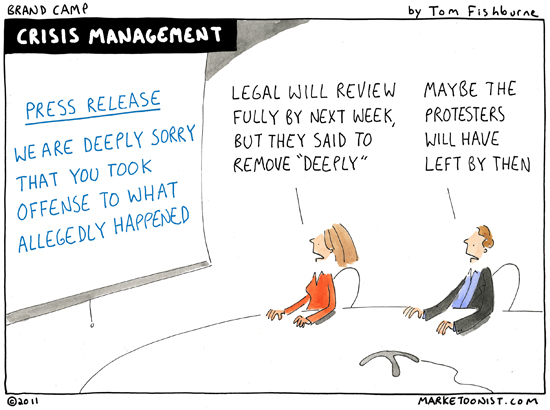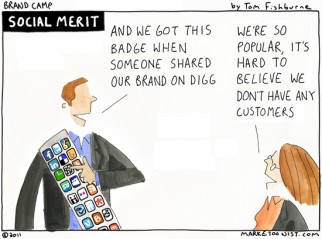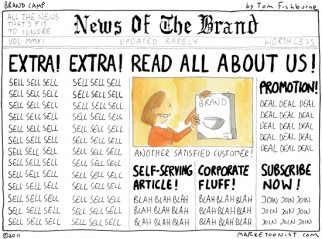Crisis management may not be one of the 4 Ps, but it is every much a part of marketing. How a company deals with a crisis is a far greater litmus test for the brand than how it executes an advertising campaign.
Yet often the loudest voice in the midst of a crisis is legal. Sure, a legal liability assessment is important. But, unchecked, a legal bias can lead to keeping too silent in a crisis, not admitting mistakes, and not showing empathy, the perfect storm for a PR disaster.
2010 was the year of crisis management, with BP, Toyota, and Goldman Sachs all botching PR in the midst of a crisis. The New York Times profiled the 3 fiascos in a cautionary tale: “In Case of Emergency: What not to do.”
Communications strategist Eric Dezenhall categorizes most crisis management as “absolute chaos”:
“Nobody knows what the facts are. The lawyers are trying to get the P.R. consultants fired and the P.R. consultants are criticizing the lawyers. Everybody despises each other. It’s a totally unmanageable situation. A corporation in crisis is not a corporation. It is a collection of panicked individuals motivated by self-preservation.”
My very first week at Harvard Business School, we were taught J&J CEO James Burke’s response to the 1982 Tylenol poisoning. He overruled the counsel of his lawyers and went on Donahue to talk directly to angry parents. In the class, the professor read a particularly tough parent question from that Donahue show and cold-called students to answer it. One by one, we all fumbled and defaulted to the familiar pat corporate-speak responses. She then read James’ real response and it struck me how empathetic and human it was.
The Tylenol case is a classic for a reason. Only by setting aside concerns of liability was Tylenol able to save its reputation.
As marketers, most of us won’t face crises at the same magnitude of a BP or a Tylenol poisoning. But we will see smaller ones at a far greater frequency than ever before. In a social media world, screw-ups spread instantaneously (and anything that smacks of spin doctoring is ridiculed). And as a friend in PR told me, these crises usually happen on a Friday afternoon when everyone’s already left for the weekend. As marketers, how we address these crises says everything about the brand.
When I first moved to the UK, beloved smoothie brand Innocent Drinks made the controversial decision to sell their smoothies in McDonalds. “Not so innocent” ran the headlines and critics charged that the founders had sold out their ethical beliefs. Rather than dodge the issue, Innocent hosted the whole contentious discussion publicly on their blog: “To Burger or Not To Burger“. They didn’t edit comments and encouraged all points of view, good, bad, and ugly. Whether or not you agreed with their decision, you couldn’t help but respect how they handled it. It said a lot about the brand. And, if Innocent hadn’t hosted the conversation, the conversation would still have happened.
I’d love to hear any illustrative examples you know (positive or negative) for how businesses have handled crisis management.
In a business, everyone works in marketing, even the lawyers.
(Marketoonist Monday: I’m giving away two signed prints of this week’s cartoon. Just share an insightful comment to this week’s post. I’ll pick one comment from my blog and one comment from Facebook at 5:00 PST on Monday. Thanks!)



Gaurav Kataria says
Dear Tom,
You make very valid points: Open communication and empathy help in most cases.
The best example of crisis management is not to let the bad news get out into the public. The PR fraternity is always blamed for the ones that do leak, buy never get credit for the 100’s they prevent!
Having said this: I believe the most overlooked role in a corporation is to manage the employees. Often a lack of communication internally leads to lots more damage than from the outside. On the contrary, well educated employees often help douse the fire.
angela says
We just learned this the hard way when a sponsor’s bad move put our cause in a negative light. The fall out on Facebook especially was immediate, and brutal. Where we were normally a part of the conversation online, now there was silence. Not because we didn’t want to comment, but because the system of running things up the ladder, vetting every letter, just doesn’t work anymore. “Can’t wait to see what 2 lines statement they’ll give us tomorrow,” someone wrote. And of course, that’s what we did. We took too long to respond, too long to truly be up front and too long to distance ourselves from the sponsor. That’s the formula for forgiveness I think: responsiveness, honesty, strong action.
LeahG says
A recent example might be the Taco Bell meat lawsuit. Wasn’t paying attention until after the suit was dropped and TB ran a full page ad with a headline something close to ‘would it have killed you to say you’re sorry?’ Seemed like a really poor choice of words to close the issue– death and meat.
Motrin Moms might be another example.
Debra Jack says
Thank you for this one! As a longtime crisis/issues practioner at Edelman your comments are spot on. It’s generally not the crisis itself, but the company’s response (tone, response time, content, etc) to the crisis that becomes the problem. The good news is that more and more I’m seeing legal and PR teams having a healthy respect for what each brings to the table; collaboration and partnership are crucial.
Here’s a good article about the Sony Playstation issue that supports your points.
http://www.thedrum.co.uk/news/2011/04/27/21076-how-is-sony-handling-playstation-pr-crisis-/
Bobs says
It seems that crisis management handled well is little more than following the Golden Rule: do unto others as you would have them do unto you. Innocent Drinks and Tylenol gave their concerned customers just what they themselves would have wanted in similar situations; the chance to be heard, considered and cared about. However, because of the fear of accepting blame etc. so many get it wrong and as such a mountain is made of a molehill.
Having said that, there are still countless examples of crisis management that never reach the social networks or media, simply because the Golden Rule was followed. For example, I recently purchased an outdoor setting and one of the chairs broke. Frustrated, I went back to the store I purchased it from and without even requesting to see the broken chair they gave me a new one. What they did was simple: they heard me, considered me and cared about me. Crisis management at its best!
tomfishburne says
Great points, everyone, thanks! A lot of great case studies to check out. I think it would be good to have a crisis management section added to every brand’s marketing plan. You don’t want to have to figure it out on the fly!
This week’s winners are Angela (here on the blog) and Ian (over on FB http://www.facebook.com/marketoonist ). Signed cartoons are on the way. Thanks!
-Tom